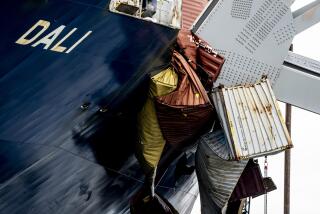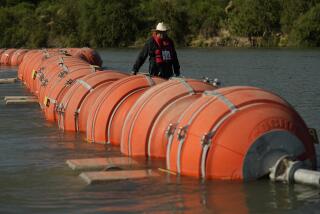Louisiana officials use barges to keep oil out of key bay
- Share via
Reporting from Los Angeles and New Orleans — In a desperate effort to keep oil from surging deeper into Louisiana’s largest estuary, Jefferson Parish officials Saturday began lining up as many as 63 barges across two passes to protect one of its ecological jewels, Barataria Bay.
“We call it Cajun ingenuity,” said Dean Bonano, the homeland security chief for Jefferson Parish. “And if it works, we will extend it to the other three passes entering the bay.”
By Saturday afternoon, 18 barges were positioned across the 7,000-foot wide entrances to Pass Abel and Four Bayou. The passes are the largest entrances to the bay, a vital area for ecotourism, recreational fishing and shellfish harvesting, Bonano said.
After weeks of frustration watching floating booms fail to keep oil out of entry passes, the leaders of Jefferson Parish decided to take a bolder action by importing the barges. More than 2 million feet of boom has been deployed in the gulf, but rough seas, winds and wave after wave of oil can limit the effectiveness of boom.
With the state’s economy — including fishing and tourist industries — devastated by the largest oil spill in U.S. history, angry Louisiana officials have pushed for more aggressive government action to protect shores and bayous. Two weeks ago, they won approval for a controversial plan to build sand berms in an attempt to protect barrier islands.
The barges in Barataria Bay are 110 feet to 200 feet long and are filled with water to lower the hulls 6 feet, creating an underwater wall, Bonano said. The boats were being lined up at an angle to steer oil into shallow waters, where it could be easily recovered by skimmers, Bonano said.
Parish officials expect to have 63 barges deployed by next Sunday. If the barges work, Bonano said they could eventually be replaced with rock berms, which would require approval from the Army Corps of Engineers.
Meanwhile, BP’s cleanup efforts were briefly hampered when a drill ship shut down around 8 p.m. Friday for maintenance on a flame arrestor. Operations resumed early Saturday morning. On Friday, the containment system had captured 24,500 barrels of oil, about 1,000 less than on Thursday.
While the latest measure was being deployed in the gulf, BP CEO Tony Hayward provoked more criticism Saturday after he was seen relaxing at a yacht event on the Isle of Wight off England’s south coast.
He was reportedly watching Bob, his yacht, at the Round the Island Race, sponsored by JP Morgan Asset Management. BP spokesman John Curry confirmed Hayward’s outing.
“I know he’s spending some private time with his family,” Curry said. “It’s good to recharge every once in awhile.”
He said Hayward has been working on the spill since April 20 and that the CEO’s absence won’t affect gulf operations.
In an interview with ABC’s “This Week” that will air Sunday, White House Chief of Staff Rahm Emanuel said Hayward’s trip was yet another PR blunder for the embattled CEO. Last month, Hayward said, “I’d like my life back,” when commenting on his goal to quickly cap the well, a statement that was interpreted as a sign of callousness.
“Well, to quote Tony Hayward, he’s got his life back, as he would say,” Emanuel told ABC. “And I think we can all conclude that Tony Hayward is not going to have a second career in PR consulting.”
BP officials also sought to clarify a statement made Friday by company chairman Carl-Henric Svanberg, who told Sky News television in Britain that Hayward was handing over daily operations of the gulf oil spill to managing director Robert Dudley, a Mississippi native. Svanberg also said, “It is clear Tony has made remarks that have upset people.”
Curry emphasized that the transition to Dudley in gulf operations has been in works for weeks and that Hayward is still in control of BP’s overall operations.
“He’s still always in touch with whatever’s going on with BP,” Curry said of Hayward. “He’s still reachable; he’s still available to be engaged.”
More to Read
Sign up for Essential California
The most important California stories and recommendations in your inbox every morning.
You may occasionally receive promotional content from the Los Angeles Times.















